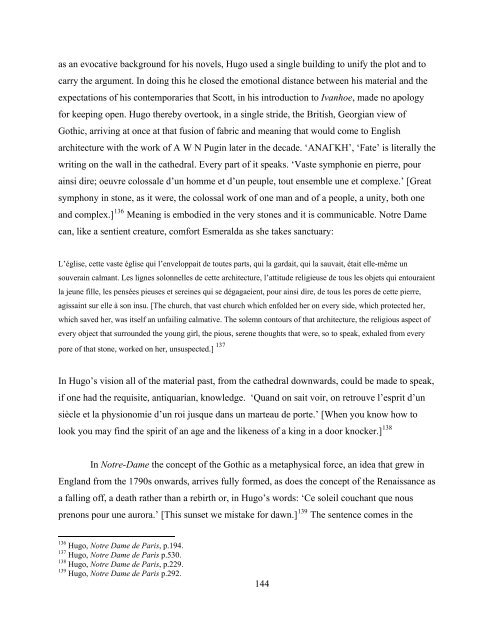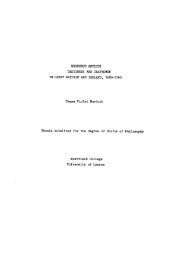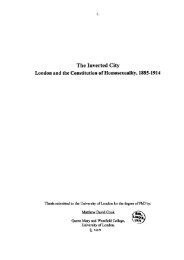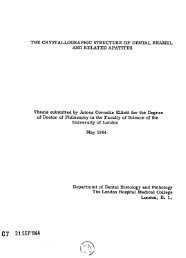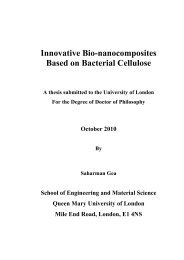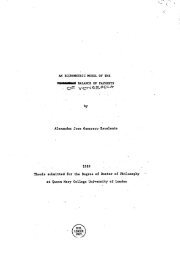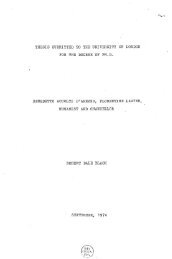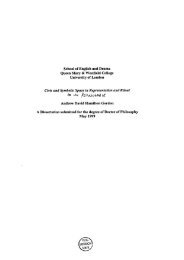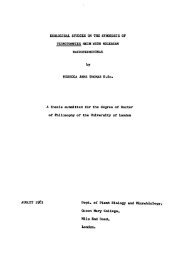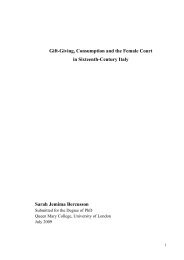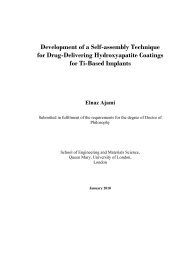Antiquaries in the Age of Romanticism: 1789-1851 - Queen Mary ...
Antiquaries in the Age of Romanticism: 1789-1851 - Queen Mary ...
Antiquaries in the Age of Romanticism: 1789-1851 - Queen Mary ...
Create successful ePaper yourself
Turn your PDF publications into a flip-book with our unique Google optimized e-Paper software.
as an evocative background for his novels, Hugo used a s<strong>in</strong>gle build<strong>in</strong>g to unify <strong>the</strong> plot and to<br />
carry <strong>the</strong> argument. In do<strong>in</strong>g this he closed <strong>the</strong> emotional distance between his material and <strong>the</strong><br />
expectations <strong>of</strong> his contemporaries that Scott, <strong>in</strong> his <strong>in</strong>troduction to Ivanhoe, made no apology<br />
for keep<strong>in</strong>g open. Hugo <strong>the</strong>reby overtook, <strong>in</strong> a s<strong>in</strong>gle stride, <strong>the</strong> British, Georgian view <strong>of</strong><br />
Gothic, arriv<strong>in</strong>g at once at that fusion <strong>of</strong> fabric and mean<strong>in</strong>g that would come to English<br />
architecture with <strong>the</strong> work <strong>of</strong> A W N Pug<strong>in</strong> later <strong>in</strong> <strong>the</strong> decade. ‘ΑΝΑΓΚΗ’, ‘Fate’ is literally <strong>the</strong><br />
writ<strong>in</strong>g on <strong>the</strong> wall <strong>in</strong> <strong>the</strong> ca<strong>the</strong>dral. Every part <strong>of</strong> it speaks. ‘Vaste symphonie en pierre, pour<br />
a<strong>in</strong>si dire; oeuvre colossale d’un homme et d’un peuple, tout ensemble une et complexe.’ [Great<br />
symphony <strong>in</strong> stone, as it were, <strong>the</strong> colossal work <strong>of</strong> one man and <strong>of</strong> a people, a unity, both one<br />
and complex.] 136 Mean<strong>in</strong>g is embodied <strong>in</strong> <strong>the</strong> very stones and it is communicable. Notre Dame<br />
can, like a sentient creature, comfort Esmeralda as she takes sanctuary:<br />
L’église, cette vaste église qui l’enveloppait de toutes parts, qui la gardait, qui la sauvait, était elle-même un<br />
souvera<strong>in</strong> calmant. Les lignes solonnelles de cette architecture, l’attitude religieuse de tous les objets qui entouraient<br />
la jeune fille, les pensées pieuses et sere<strong>in</strong>es qui se dégagaeient, pour a<strong>in</strong>si dire, de tous les pores de cette pierre,<br />
agissa<strong>in</strong>t sur elle à son <strong>in</strong>su. [The church, that vast church which enfolded her on every side, which protected her,<br />
which saved her, was itself an unfail<strong>in</strong>g calmative. The solemn contours <strong>of</strong> that architecture, <strong>the</strong> religious aspect <strong>of</strong><br />
every object that surrounded <strong>the</strong> young girl, <strong>the</strong> pious, serene thoughts that were, so to speak, exhaled from every<br />
pore <strong>of</strong> that stone, worked on her, unsuspected.] 137<br />
In Hugo’s vision all <strong>of</strong> <strong>the</strong> material past, from <strong>the</strong> ca<strong>the</strong>dral downwards, could be made to speak,<br />
if one had <strong>the</strong> requisite, antiquarian, knowledge. ‘Quand on sait voir, on retrouve l’esprit d’un<br />
siècle et la physionomie d’un roi jusque dans un marteau de porte.’ [When you know how to<br />
look you may f<strong>in</strong>d <strong>the</strong> spirit <strong>of</strong> an age and <strong>the</strong> likeness <strong>of</strong> a k<strong>in</strong>g <strong>in</strong> a door knocker.] 138<br />
In Notre-Dame <strong>the</strong> concept <strong>of</strong> <strong>the</strong> Gothic as a metaphysical force, an idea that grew <strong>in</strong><br />
England from <strong>the</strong> 1790s onwards, arrives fully formed, as does <strong>the</strong> concept <strong>of</strong> <strong>the</strong> Renaissance as<br />
a fall<strong>in</strong>g <strong>of</strong>f, a death ra<strong>the</strong>r than a rebirth or, <strong>in</strong> Hugo’s words: ‘Ce soleil couchant que nous<br />
prenons pour une aurora.’ [This sunset we mistake for dawn.] 139 The sentence comes <strong>in</strong> <strong>the</strong><br />
136 Hugo, Notre Dame de Paris, p.194.<br />
137 Hugo, Notre Dame de Paris p.530.<br />
138 Hugo, Notre Dame de Paris, p.229.<br />
139 Hugo, Notre Dame de Paris p.292.<br />
144


